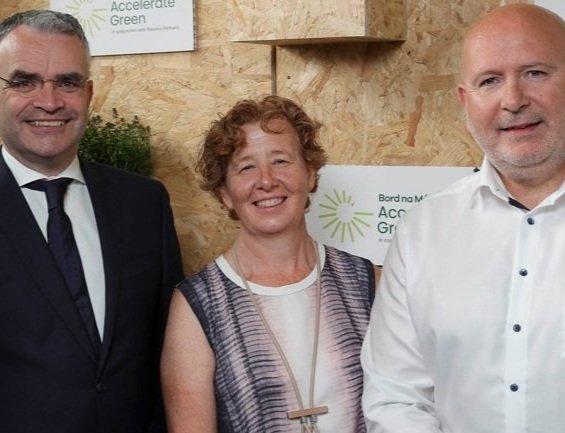The Circular Economy Mandate in Irish Road Construction
The days of “dig it up and dump it” are over.
With the launch of Ireland’s Circular Economy Strategy and the National Waste Management Plan for a Circular Economy (2024–2030), local authorities are now expected to treat construction materials as valuable resources, not disposable by-products.
Nowhere is this shift more visible than in road construction—and particularly in the handling of blacktop planings.
Digital Waste Tracking: From Obligation to Opportunity
For Irish local authorities, the pressure is growing—not just to manage waste, but to account for one of the most valuable and overlooked public assets in road construction: milled blacktop.
Every year, thousands of tonnes of high-value asphalt are scraped from Ireland’s roads during resurfacing. This material—known as road planings—is not just reusable, it’s financially valuable. Yet in far too many projects, it goes untracked, underreported, or disappears entirely.
How Hub360 Prevents Greenwashing in CSRD Reporting
As sustainability regulations tighten across Europe, the pressure on companies to back up their climate claims has never been greater. Under the Corporate Sustainability Reporting Directive (CSRD), organisations must disclose detailed, verifiable emissions data—including Scope 1, 2, and 3—with the same rigour as financial reporting.
The National Waste Management Plan for a Circular Economy: A Turning Point for Ireland’s Construction Sector
On March 1st, 2024, Ireland took a significant step towards a sustainable future with the launch of the National Waste Management Plan for a Circular Economy. This plan, which will guide waste prevention and management from 2024 to 2030, is a comprehensive roadmap for reducing waste, promoting reuse, and increasing recycling rates across key sectors, including construction and demolition (C&D).
EPA Ireland Guidelines & Circular Economy Principles in Construction - How HUB360 Facilitates Implementation
The concept of a circular economy in the construction industry focuses on reducing waste, promoting recycling, and encouraging the sustainable use of resources. Here are some key aspects that the EPAN in Ireland have emphasised in waste their management guidelines:
Why Prioritising Digital Solutions for Construction & Demolition Waste Management is Essential?
Ireland’s updated Waste Management guidelines for Construction & Demolition Projects 2021 prioritises the adoption of a circular economy, emphasising reuse and recycling over disposal. This means tracking, tracing and auditing of the movement of Construction materials where the developer must “maintain records for all resource material which is used on site and leaves the site, either for reuse, recycling, energy recovery, backfilling or other recovery or disposal on third party sites” as laid out in the EPA Best Practice Guideline 2021 - for the preparation of resource & waste management plans for construction & demolition projects.
Is Enough Happening in Ireland Today to Reduce CO₂ Emissions from Heavy-Duty Vehicles ?
Hub360 were delighted that Dara Calleary, Minister of State for Trade Promotion, Digital, and Company Regulation was present, as it was suggestion that the CO₂ Emissions from Heavy-Duty Vehicles was something that would be dealt with at some future time.
Reduce HGVs Emissions Now & Save Money
Hub360 were invited to speak at Irelands sustainability conference this summer and the message we focused on getting out there at the conference was that organisations can optimise the use of HGVs to achieve both emission reduction and cost savings now in 2023, and to do this it’s simply not rocket science, its straightforward yet highly effective solution: organisations should wholeheartedly embrace change and harness technology to maximise the efficiency of their Heavy Goods Vehicles (HGVs).
What’s Expected from The Building Industry Operators in Ireland to Ensure Sub-contracted Drivers & Vehicles Meet their Scope 3 Obligations & Find Out How HUB360 Tipper Truck Application Helps?
In the building industry, meeting Scope 3 emissions requirements when using 3rd drivers and trucks means considering the indirect greenhouse gas (GHG) emissions associated with the transportation of goods and services of those 3rd parties i.e. Scope 3 emissions are indirect emissions that occur throughout the entire value chain of an organisation's activities, including those that are not directly owned or controlled by the organization.
What is Scope 3? What do manufacturers need to be ready? and how can HUB360 help organisation’s make real impact?
Scope 3 refers to the indirect greenhouse gas (GHG) emissions that occur in a company's value chain, beyond its direct operations. It includes emissions from the transportation and distribution of goods.
Manufacturers, being a key part of supply chains, need to be prepared for Scope 3 emissions by:
The 3 biggest headaches for manufacturing companies delivering to their customer and how HUB360 can transform the process and just take away the pain?
Lack of visibility: One common pain point for manufacturers is not knowing where their shipments are in real-time or having a clear picture of their entire delivery planning and schedules. HUB360 provides real-time tracking and visibility of all shipments, allowing manufacturers to make more informed decisions about inventory management, customer service, and other aspects of their operations.
Want to Scale your business? Then find out the TOP 7 reasons you need a full 360-degree view of all your delivery activities
Read on to find out the TOP 7 Key reasons why CEOs need to ensure their team has a full visibility and control of all customer orders, at all times, to successfully grow and scale.












